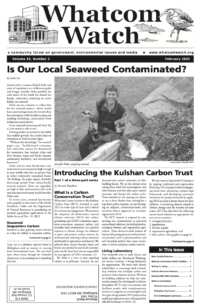Part 1 of a three-part series
by Howard Sharfstein
What Is a Carbon Conservation Trust?
Whatcom County is home to the Kulshan Carbon Trust (KCT), founded in early 2021 as a new type of trust and a vehicle for community engagement. We promote the adoption of collaborative natural climate solutions (NCS) that reduce greenhouse gas (GHG) emissions, regenerate ecosystems, sequester carbon, and revitalize rural communities. As a positive response to climate change, we endeavor to grow and protect carbon reserves by systematically reducing carbon emissions attributable to agriculture and forestry. We selected these sectors because farms and forests are essential to our local economy, and, overall, these land uses are responsible for one-quarter of GHG emissions. (1)
We think it is time to stop regarding carbon as a pollutant. Instead, we understand that carbon molecules are life’s building blocks. We see the climate crisis arising from fossil fuel consumption and other human activities that upset natural processes and disrupt the carbon cycle. These imbalances are causing our planet to run a fever. Rather than waiting for a top-down policy response, we are developing an adaptive, community-based, and incentive-driven approach to stimulate regenerative NCS.
The KCT intends to respond by connecting our communities to practical nature-based solutions, including biochar, ecological forestry, and regenerative agriculture. These down-to-earth actions all harness life-giving physical and biochemical processes such as photosynthesis and soil microbial activity that cause ecosystems to thrive and grow carbon reserves.
Living Laboratory
Our nonprofit aims to make forests and fields within our Northwest Washington service territory a living laboratory for regeneration. We work with diverse stakeholders to encourage land stewardship methods that stockpile carbon and promote vital ecosystem services. We focus on building resilience to help our community prepare for and respond to climate disruption. KCT’s role is to convene and facilitate people with complementary interests to organize at a meaningful scale the types of regenerative NCS projects that enable participants to earn a living and the selected landscape to thrive. (2)
We also want to help fund NCS projects by tapping traditional and regenerative financing. Our strategy involves propagating know-how, advancing a proper legal framework, and developing economic incentives for people interested in applying NCS to create a better future for their children. Considering threats related to climate change and the benefits of early action, KCT has identified the following nature-based solutions as appropriate for our service territory:
1. ecological forestry,
2. agroforestry,
3. biochar supply,
4. regenerative agriculture, and
5. blue carbon. (See graphic.)
Since trees do not grow overnight and soils need time to recuperate, progress will depend on patient capital, long-term market incentives, and a resilient supply chain. Moving from conventional (i.e., extractive) agriculture to sustainable (i.e., regenerative) farming may require ReFi (i.e., regenerative financing) during the changeover. After reducing excessive fossil fuel-related inputs, yields may drop at first. Then, revenues will recover while reduced input costs enhance profitability. Workshops with local landowners can assess support needs and link resources to help foster a transition to regenerative agriculture and sustainable ecological forestry. In some cases, carbon cooperatives — modeled after agricultural coops — may emerge to aggregate small landowners and achieve the scale needed to manage costs and spread risks.
The Origin Story
What shaped the organization we now call the Kulshan Carbon Trust? Three years ago, Steve Hollenhorst was Dean of the Western Washington University Environmental College (formerly known as Huxley), and Howard Sharfstein was an adjunct professor of Environmental Law and Energy Policy and Politics at WWU. Steve and Howard held a series of carbon conversations discussing their mutual interest in conservation and climate.
Steve recalled helping found the West Virginia Conservation Land Trust and recounted his journey as an environmental leader in academia. He wondered aloud whether we could do for carbon what land trusts have done for decades to protect other ecological values. Howard reminisced about his decades as an attorney supporting environmental compliance, alternative energy, and business sustainability. The ensuing discussion of legal tools and market incentives led us to envision a new legal entity we called the carbon conservation trust (CCT).
After consulting several colleagues at WWU, Steve and Howard conceived CCTs in late 2019. The first months of our venture coincided with the onset of Covid-19. In March 2020, Howard returned from an overseas trip and reentered an unfamiliar world of isolation. Steve was immersed in helping WWU navigate unprecedented conditions brought on by the powerful pandemic. Rather than the accustomed face-to-face meetings to cultivate our ideas, for most of 2020, we collected our thoughts separately and later began to compare notes by drafting a white paper on CCTs.
That summer, Jessa Clark joined us. Jessa had also been traveling around the world to celebrate her Stanford Masters in Sustainability Leadership. Her travels were interrupted by Covid-19, and Jessa came back to Bellingham, her hometown, and began working with David Roberts at Kulshan Services (now Peak Sustainability Group). At that point, the carbon trust movement had three co-founders. Jessa added systems thinking and a next-generation mindset to the CCT’s DNA.
In Winter 2021, we enlisted our first cohort of graduate fellows (Emily Pittis and Dana Ringler) and six WWU interns. Jessa worked as the team leader. Our new idea needed fertile young minds to shape the mission and capable researchers to create a growth plan for our new nonprofit. On April 7, 2021, the Washington Secretary of State accepted the Articles of Incorporation, and a new nonprofit named Kulshan Carbon Trust was born!
We made an announcement four weeks later by publishing our initial white paper — Creating a Carbon Conservation Trust Movement. (3) Soon after that, Martin Mehalchin and Andrew Shelton joined the board, and we approved KCT’s Bylaws and adopted the following vision and mission.
KCT is now 21 months old. The three co-founders and all our team members know that KCT needs help to reach its potential. KCT’s leadership team has turned its attention to stakeholder outreach and community engagement. We have added three talented communicators to our board of directors, namely, Erika McPhee-Shaw, Stefanie Cilinceon, and Sarah Parker. And after a travel leave, Jessa has returned to our staff and is leading KCT into the future.
As our nonprofit grows, we aspire to help make forests and fields within our region thrive and become more resilient to the onrushing forces of a changing climate. By combining the urgency posed by the unfolding climate crisis with the many splendid opportunities for job creation via community-based natural climate solutions, our service territory in Northwest Washington (4) has the potential to emerge as a center of excellence for regeneration and resilience. If you are interested in helping advance the work of the Kulshan Carbon Trust, please contact us through our website (5) or at info@kulshancarbontrust.org.
Our Theory of Change
We observe that the unsustainable exploitation of natural resources often arises from economic pressures on landowners who perceive few financial choices that do not damage their property’s ecological integrity and future vitality. Conservation land trusts have already demonstrated how to protect ecosystems by unbundling certain property rights. Inspired by land trusts, our first-of-its-kind local carbon trust seeks to extend American property law doctrines (6) through an incentive structure that uses eco-credits to award economic value to carbon sequestration and other ecosystem services.
Through an adaptable and scalable business model, we believe carbon trusts can contribute to a supply chain that helps decarbonize the economy. Carbon trusts will use various tools (7) to secure the long-term viability of NCS projects and support payments to landholders who adopt and sustain climate-friendly practices.
Our theory of change views NCS projects as an excellent way for people to earn a living while engaging in community climate action. We envision the carbon trust as a hub connecting stakeholders to the work of carbon conservation. The KCT’s role is to be a platform for building alliances that effectively support land stewards who implement regenerative NCS projects. We employ a collaborative approach to help our communities prepare and adapt to a changing climate. Our enablement strategy involves spreading know-how, recommending methods and practices, curating a capable supply chain, and identifying economic incentives to support these projects. As NCS proponents, KCT will convene and facilitate local practitioners and proven professionals to work with interested landholders on ventures that reward participants and strengthen community resilience.
Unlike a traditional developer, as a tax-exempt nonprofit organization, our role will include:
1. posing pertinent questions,
2. finding best practices,
3. applying replicable processes,
4. encouraging equitable transactions, and
5. developing versatile training materials.
We want to demonstrate the viability of inclusive, interdisciplinary, and intergenerational governance that enables stakeholder engagement, public outreach, long-term finance, and legal documentation for biochar and other NCS opportunities.
Our young nonprofit is beginning to demonstrate the ability to tap credible networks that support these endeavors. We are refining a workgroup model to incubate value chains for regenerative NCS. KCT will serve as a process leader and focus on convening, facilitating, and enriching engagement among diverse cohorts (e.g., landholders, investors, suppliers, contractors, workers, and verifiers) for these multifaceted efforts. Carbon trust workgroups will help problem-solve in support of stakeholders and land stewards who will collaborate to deliver food, fiber, and conservation (i.e., eco-credits) to the marketplace. We will foster alliances and boost business deals that achieve scale, spread costs, and bolster common interests in the furtherance of NCS projects.
KCT knows that we can’t do this alone and that our partners must balance experience and innovation. We also recognize that our workgroups require multidisciplinary solutions that lead to intergenerational action. So far, we have engaged Konrad Liegel, one of our state’s leading land trust attorneys, to serve as counsel for KCT-sponsored carbon conservation projects. His experience will help assure market participants that carbon assets are legally protected.
In addition, KCT is working with John MacLean, the principal of Energy Efficiency Finance Corporation, to apply his experience in energy efficiency and renewable energy project finance to fund natural climate solutions. KCT is also engaged with the Regen Network and others to unlock opportunities for innovative funding through Web3 regenerative finance (ReFi) and access to the leadership of effective regenerative organizations operating in other bioregions.
What’s Next?
To create rewarding jobs protecting the climate, we need an organized and sustainable NCS framework that connects selected local businesses. In that regard, KCT intends to form a capable and trustworthy network to provide land stewards in our region with the goods and services they need to implement beneficial natural climate solutions. We see carbon trust workgroups as a vehicle for assembling stakeholders and linking local companies (including cooperatives and family businesses) with experienced enterprises that complete an enduring value chain.
To solidify this effort, KCT will seek funding to develop model agreements that can reduce transaction costs and improve income for people working in this field. Over time, these model terms and conditions can provide the legal scaffolding for conserving carbon. Moreover, these model agreements will secure property rights and inject high ethical standards of good faith and fair dealing to govern business transactions and inspire trust among stakeholders. (8)
Through KCT’s recent biochar pilot project, (9) we began establishing proof of concept for our economic incentives and organizational design. We aim to show that our collaborative processes can catalyze and scale regenerative action. Our pilot project featured an advisory workgroup tasked with helping valorize (i.e., validate) eco-credits for our biochar pilot project. (10) Having completed both the peer and expert review stages, our revisions to the biochar methodology will undergo two weeks of public comment before final approval. Upon approval, our application to list biochar as a credit class on the Regen Registry will be complete, and our biochar carbon credits will be ready for the Regen Marketplace.
In 2023, KCT will conduct several workshops to share our biochar learnings and gather input for expanding biochar’s role as a keystone natural climate solution in our bioregion. Biochar originates from indigenous people’s traditional land management practices in many places. It has been recently “rediscovered” as a modern method for harvesting waste biomass to reduce carbon emissions from open burning and decomposition with many benefits that include the following (see above chart): (11)
We are actively planning additional local NCS pilot projects to stockpile carbon, water, and nutrients to demonstrate what we can do together to reestablish thriving soils and propagate more verdant vegetation. We will consider opportunities and seek grant funding to cooperate with early adopters in our communities and carry out additional pilot projects that both demonstrate KCT’s theory of change and the viability of incentives for locally relevant natural climate solutions, including, for example: (12)
• Agroforestry projects that can augment revenue from growing perennial food crops (e.g., fruit and nuts) with the value of eco-credits. (13)
• Phase 2 of KCT’s biochar pilot project. (14)
• Ecological forestry with landholders that have made strong sustainability commitments or in connection with community forests and other conservation holdings.
• Valorization of regenerative agriculture to support local champions of climate-friendly farming practices.
Conclusion
KCT is evolving into an organization designed for community engagement that inspires problem-solving, reciprocity, and collective action. Our workgroups comprise students, community leaders, business managers, professionals, practitioners, and landholders working to develop and scale NCS projects. Team members gather data, consult thought leaders, and evaluate indigenous, conventional, and innovative land management methods to revitalize ecosystems and optimize carbon conservation. We aim to make our service territory around the Salish Sea a proving ground for natural climate solutions that can decarbonize the economy and help its communities adapt to impending climate disruption at the landscape level. Our ultimate goal for the Kulshan Carbon Trust is to successfully demonstrate a flexible, scalable, and replicable model for a widespread carbon conservation trust (CCT) network that we will call The Carbon Conservancy™.
Please visit our website at kulshancarbontrust.org and look for two more articles in Whatcom Watch. If you support our mission, please go to the Kulshan Carbon Trust website to find out how to get involved.
Endnotes
1. Project Drawdown has calculated that by 2050 between 204.2–273.9 gigatons of CO2 equivalent can be reduced or sequestered worldwide through the food, forestry, and land use solutions it has identified. See https://drawdown.org/sectors/food-agriculture-land-use.
2. As facilitators, KCT will help participants in the venture develop collaborative project designs that fulfill their interests and achieve economies of scale, make transaction costs affordable, and enable value chain participants to share project risks and rewards.
3. https://steve-hollenhorst.medium.com/creating-a-carbon-conservation-trust-movement-dc208e0a2082
4. The area that comprises KCT’s service territory includes Whatcom, Skagit, Island, and San Juan counties.
5. https://www.kulshancarbontrust.org/
6. We are working with Representative Alex Ramel and others to remove any ambiguity that carbon attached to the land is a severable property interest akin to mineral rights which a landowner can sell or otherwise transfer to a third-party.
7. We expect carbon trusts will harness the legal and policy tools of (1) conservation easements/covenants, (2) carbon markets/exchanges, (3) sustainable/regenerative finance, and (4) carbon cooperatives.
8. In supporting NCS projects, KCT wants to establish a model for CCTs to develop forms of agreement that harmonize the interests of land stewards, supply chains, and funding sources. These model agreements can be adjusted to fit applicable local laws and adapted to the business terms that project participants negotiate.
9. We are preparing an article on the results of our biochar pilot project for the next issue of Whatcom Watch.
10. This advisory workgroup provided guidance and feedback for our team to adapt the recently approved Verra carbon credit methodology for biochar to forestry residue. KCT’s staff (Ava Stone and Gabe Travis) identified scientific evidence and policy support for permitting prompt in-stand biochar application without importing compost or transporting the material offsite.
11. https://www.kulshancarbontrust.org/biochar
12. The third and final Whatcom Watch article will discuss in some detail our plans and priorities for fostering future natural climate solutions.
13. https://www.kulshancarbontrust.org/agroforestry
14. The second article in our Whatcom Watch series will have the results of our biochar pilot project and outline our plans for Phase 2, which we will discuss in more detail in our third article about the future of Kulshan Carbon Trust.
Part II: Results of Kulshan Carbon Trust’s biochar pilot project.
_____________________
Howard Sharfstein is a co-founder and serves as President of the Kulshan Carbon Trust. He is a retired environmental attorney and former corporate sustainability leader. Howard has taught both Environmental Law and Policy and Energy Policy and Politics at WWU and advises on climate planning at Peak Sustainability Group.































